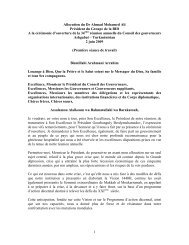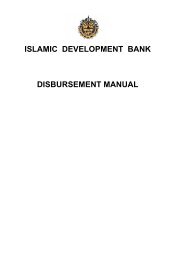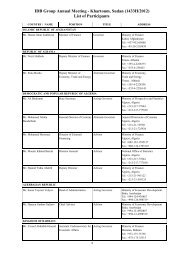Mauritania - Islamic Development Bank
Mauritania - Islamic Development Bank
Mauritania - Islamic Development Bank
Create successful ePaper yourself
Turn your PDF publications into a flip-book with our unique Google optimized e-Paper software.
Intervention Program (SIP) amounting to about<br />
US$ 194.2 million. The SIP, representing 15% of<br />
total public spending, increased the public deficit<br />
by 1% and helped to avoid social unrest although<br />
its effectiveness in alleviating food insecurity is<br />
not clear—see Section V—and inflation fell to<br />
3.9% (by yearend) in 2008, in comparison with<br />
7.4% in 2007.<br />
12. Poverty declined between 2004 and<br />
2008 but remains high and is mainly a rural<br />
phenomenon. Poverty incidence has declined<br />
from 47.6 percent in 2004 to about 42 percent<br />
in 2008 (Figure 3). The percentage of population<br />
living in extreme poverty in rural areas increased<br />
from 39.1% in 2004 to 40.8% in 2008. Recent<br />
domestic and external shocks have likely slowed<br />
progress on poverty reduction, highlighting the<br />
need to protect social spending and develop<br />
appropriate safety nets for the most vulnerable<br />
segments of the population. In fact, the poverty<br />
rate increased marginally in rural areas over the<br />
period 2004 - 2008 (from 59% in 2004 to 59.4% in<br />
2008).<br />
13. Poverty is more pronounced among<br />
households headed by persons employed in<br />
the agriculture sector and is increasing with<br />
the household size 1 . Data show that households<br />
headed by people employed in agriculture<br />
(including livestock) are the most affected by<br />
poverty, followed by those employed in the<br />
transport and communication sector. However,<br />
households headed by public sector wagesearners<br />
are less exposed to poverty.<br />
1 According to the EPCV 2008.<br />
4<br />
14. There was a progress in the social sectors,<br />
but the achievement of the Millennium<br />
<strong>Development</strong> Goals (MDGs) remains a key<br />
challenge. <strong>Mauritania</strong> ranked 154 out of 182<br />
countries according to the Human <strong>Development</strong><br />
Index in 2009. Overall, the most important<br />
deficiencies in the progress toward the<br />
achievement of the MDGs in <strong>Mauritania</strong> are<br />
related to health, environment, employment<br />
and some gender indicators (UNDP 2010). Table<br />
1 shows that although <strong>Mauritania</strong> is likely to<br />
meet its MDG relating to access to water, it faces<br />
challenges in meeting the MDGs particularly<br />
related to maternal and child mortality.<br />
15. As in other countries, food insecurity is<br />
associated with poverty and remains one of<br />
the most important causes of malnutrition in<br />
<strong>Mauritania</strong>. Based on FAO estimates, 29% of<br />
<strong>Mauritania</strong>n households were food insecure in<br />
2008. Almost half of households do not have<br />
access to safe drinking water and diarrheal<br />
diseases, malaria and acute respiratory infections<br />
still claim the lives of many young children. The<br />
underperformance of the agriculture sector,<br />
characterized by an under exploitation of arable<br />
lands and slow progress of irrigation, is an<br />
important cause of food insecurity. In addition<br />
to the hard climate conditions, weak productivity<br />
of rural sector has exacerbated the threats of<br />
food insecurity on the <strong>Mauritania</strong>n economy.<br />
Land degradation, weak mechanization, high<br />
production costs, low access to agricultural loans,<br />
absence of loans devoted to livestock activities<br />
and lack of supports to commercialization are<br />
among the main factors contributing to these low<br />
productivity of the rural sector.<br />
16. More recently, lower food and fuel prices<br />
accompanied by the normalization of relations<br />
with the international community have helped<br />
cushion the impact of the global economic<br />
slowdown on the external position. The current<br />
account deficit was 12.7 percent in 2009, down<br />
from 15.7 percent in 2008. The decline in exports<br />
was more than offset by a marked reduction in<br />
imports, reflecting the contraction in economic<br />
activity, lower world food and fuel prices, and<br />
the foreign exchange rationing. The resumption<br />
MCPS for <strong>Mauritania</strong>, 2011-2015






